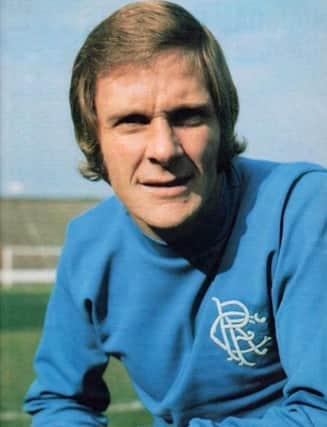Obituary: Joe Mason, footballer and highly-respected first team coach with Rangers


Joe Mason, who has died aged 79, was a talented and highly regarded Scottish footballer who played more than 270 games and scored over 100 goals throughout the 1960s and early ’70s.
His career began at local club Kilmarnock for whom he played 55 times between 1960 and 1966 prior to joining Morton. He recorded about 200 appearances for the Greenock club until 1972 when, rather unusually in the autumn of his career, he joined Rangers aged 32, for whom he played briefly before continuing in a coaching post.
Advertisement
Hide AdAdvertisement
Hide AdIn the 1960s Kilmarnock were one of the country’s top teams under the astute leadership of manager Willie Waddell, who led them to the old First Division league title in 1965, having finished runners-up four times in the preceding five seasons.
Although a young Mason understandably found it difficult to establish himself as a first team regular he did make four appearances in the league-winning team and gradually built a reputation as a clever, insightful player with an eye for goal, managing to notch 23 while there. He felt privileged to represent his home town team but had to move on to secure first team football.
At Morton as an attacking midfielder he became an established player, whose ability at holding up the ball and creating opportunities for others made him a valuable cog in a successful Cappielow outfit under the guidance of the inimitable Hal Stewart.
He appeared in two Scottish Cup semi-finals and was in the first Morton team to sample European football in the old Fair Cities’ Cup in 1968 , against Chelsea, scoring a goal in an aggregate defeat. Other highlights included beating West Bromwich Albion home and away in the Texaco Cup before playing Wolves in the next round. In total he netted a useful 90 goals, including a record-breaking 44 in his first season in winning the old Second Division title.
In 1972 his age and relative lack of pace did not deter Rangers’ manager Willie Waddell, who knew him from Kilmarnock, from surprisingly buying him for £10,000, although a future coaching role was also envisaged.
Rangers’ difficult start to the season had not been improved by a home draw with Morton on 7 October. After the game, when Mason was man of the match, he was met by opposing winger Tommy McLean, a former Kilmarnock teammate, as he emerged from the visitors’ dressing room. In true cloak and dagger fashion, McLean pressed a piece of paper into his hand and instructed Mason, “phone this number tonight!”
Mason did and was delighted to find Waddell on the other end. He needed scant encouragement to join the Glasgow giants and the transfer was agreed almost immediately –no need for agents or protracted negotiations then.
While perhaps not the marquee signing many fans hoped for, Waddell made it clear that Mason brought “skill, craft and experience” to the table and expected him to build the team’s confidence with his measured play. A winning debut a week later against Motherwell saw him settle in before going on to play 17 games that season, acquitting himself well as his influence helped Rangers finish one point behind Celtic in the league and win the Scottish Cup.
Advertisement
Hide AdAdvertisement
Hide AdTwo League Cup games early in the next season brought the curtain down on his playing career and in October 1973 he was appointed Rangers’ first team coach, making a highly valued contribution to the extremely successful spell under Jock Wallace which claimed consecutive trebles.
After John Greig’s appointment as manager in 1978 yielded less success, he was replaced in 1983 by Wallace who brought in new backroom staff, spelling the end of Mason’s Ibrox career. It caused him considerable disappointment but with the passage of time he accepted it more philosophically.
Joseph Paul Smith Mason was born in Kilmarnock where he was brought up with siblings Alex and Marjory in Townholm by parents Alex and Esther.
He attended James Hamilton Academy after which, among other jobs, he worked in local brickworks. At the same time he showed promise at football, playing for teams in the area including Saxone and Dreghorn. While later playing for junior side Lugar Boswell Thistle in the notoriously competitive Ayrshire Juniors he was spotted by Kilmarnock, for whom he signed in 1960 to launch his career.
In March 1964, in Kilmarnock, he married local girl Veronica Bryson. They lived their whole married life in Kilmarnock, initially in the Bonnyton area, latterly in Linfern. They enjoyed a happy and rewarding 53 years until Veronica’s death two years ago, during which they had two sons, Gary and Bryan.
After leaving Ibrox Joe had no formal involvement with football. He and his wife started a fast food takeaway business in the town, building it up from scratch to a successful enterprise by dint of hard work and long hours. He set high standards for himself and expected the same from others. They retired from running it some years ago but it remains in family ownership.
Joe maintained his interest in football, mostly watching games on television with his expert knowledge regularly enabling him to foresee when a goal was about to be scored, impressing his sons considerably. He encouraged them in their interest in the game while his good values inspired both to successful careers. Outwith family and work he had little free time although he enjoyed occasional socialising.
A popular individual with teammates, thanks to his skilful, unselfish contribution he was considered a ‘player’s player,’ a high accolade among footballers. He is survived by his sister, sons and grandchildren Natalie, Nicholas, Gillian, Brogan, Kristopher, Finlay and great grandchildren Isabella and Ava.
JACK DAVIDSON